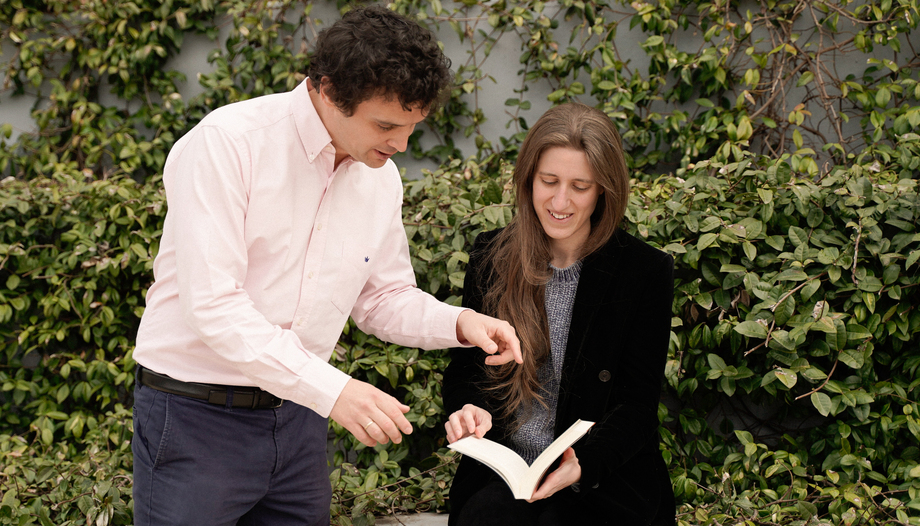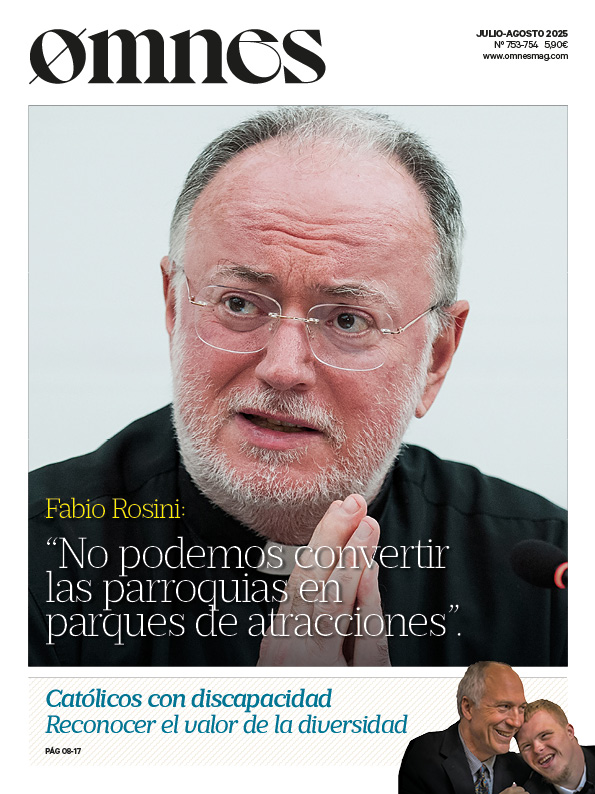María Loreto Ríos and Pedro Lara are the founders of Érase publishing house. This project seeks to bring literary quality back to the world of books, through a very careful selection and production of works.
As the founders explain, with their publications they want to "offer a literature that helps to understand reality through fiction". To do so, they look "with a magnifying glass at the moral and anthropological background of each work".
In this interview with Omnes, they talk about the origins of the editorialThe company's catalog and the current situation of literature aimed at children and young people.

What was the main motivation for founding this publishing house?
- Loreto]: Our main motivation was to note that the original structure and symbology of fairy tales had been lost in contemporary literature, mainly that aimed at children and young people, with few exceptions. This may not seem to have much relevance, but art and literature leave a lasting and deep impression on the reader. Disrupting the meaning and symbolism of fairy tales and stories can have many effects on society, even if only in a subtle way.
That said, our aim is not to offer pedagogical stories or books whose main purpose is to convey a moralizing message, but works with literary value, but which are in line with the line of fantastic and mythical literature initiated, for example, by authors such as George MacDonald, Tolkien and C. S. Lewis. S. Lewis.
Your catalog focuses on untranslated contemporary authors and works that have not been published for a long time. What criteria do you use to select authors and works? How do you balance literary quality with a focus on freshness and novelty?
- Pedro]: First of all, we pay close attention to the literary quality of the works we wish to publish; in this we are no different from other good narrative publishers. What does differentiate us is that we also look closely at the moral and anthropological background of each work.
The market of children's and young adult literature is today flooded with novels that blur, if not directly eliminate, the reality of good and evil, that disguise vice as virtue and present villains as heroes. In our works, good exists and is in continuous struggle with evil, which is nothing but the absence or deprivation of good (it has no entity of its own), and vice enslaves and destroys all those who practice it.
Closely related to the above are symbols, which have a profound influence on man, nowadays often ignored. There are many stories of magnanimous dragons and friendly wolves, apparently innocent and harmless, but which have devastating effects on the moral imagination of children, subtly undermining their ability to distinguish good from evil. That is why we always try to keep our works in line with the symbolic tradition of the West, which is a guarantee of sanity and moral health.
Finally, we are extremely concerned about the ever-increasing eroticization of young people's literature, promoted through TikTok and sponsored by the publishers who profit from it. From this, of course, we flee like the plague.
As for the balance you mention, we do not seek it, nor do we intend to seek it. We want all the works we publish to be literarily excellent and, at the same time, fresh and new. This quote from Péguy comes to mind: "Homer is new every morning, and there is nothing older than today's newspaper. In other words, freshness and novelty are characteristics of the classics, of the best literature, because it is interwoven with yearnings, aspirations, concerns and perennial and universal human experiences.
Who is the target audience of your publishing house? Who do you want to appeal to with the selection of your catalog?
- Loreto]: Érase Publishing is aimed at children and young adults, but the truth is that we believe that these types of stories can reach many other age groups. We are advocates that adults can also enjoy fairy tales and good fantasy.
Tolkien himself defines "The Lord of the Rings" thus in letter 181: "It is a 'fairy tale,' but a fairy tale written for adults, in accordance with the belief, which I once expressed at length in the essay 'On Fairy Tales,' that they constitute the right audience. For I believe that the fairy tale' has its own way of reflecting 'truth', different from allegory, satire or 'realism', and is, in some sense, more powerful. But, above all, it must succeed as a tale, excite, please and sometimes even move, and, within its own imaginary world, it must be accorded (literary) credibility. To achieve this was my primary objective.
How do you take care of the editorial process to ensure that the works are presented in the best possible way? What value do you place on the work of translators and physical editions of books?
- Loreto]: Regarding the physical editions, first of all we want to highlight the value of the illustrators and the importance of the design being in the hands of an artist and not an artificial intelligence, even if that means making the production of the book more expensive. We have a wonderful illustrator, with a degree in Fine Arts, who is in charge of the illustration and cover design, as well as the interior decorations in the case of "Once Upon a Queen".
In addition to that, we take great care that the materials of the book (paper, cover, binding, etc.) are good. We consider it very important that the book as an object is beautiful and attractive, as well as having quality and durability.
- Pedro]: And with translations we are picky to say the least! Before being editors, we have been translators, that's why we have decided to take personal charge of the translation work. And I must say that it has been a great pleasure to translate books that we love and that we have been reading, rereading and enjoying for years.
You mention the desire to encourage reading from an early age, how do you plan to bring young people closer to reading and to contemporary authors who may not be so popular yet?
- Pedro]: Unfortunately, to achieve that it is not enough to publish good books. In fact, we don't think we are discovering the gunpowder if we say that a large part of what children and young people read today (and also many adults) is literary trash.
We are convinced that, in order to face this painful situation, we must all become aware of the vital and irreplaceable role that good stories play in the education of the young. Good stories are food for the soul; they are like maps and compasses that help us to orient ourselves in life; they help us to reject evil and choose good. If we want our children and students to know the truth, we must tell them the truth. If we want them to love the truth and live by it, we must tell them good stories.
At Érase we want to collaborate with parents, teachers and educators to ensure that the imagination of our children and young people has the nourishment it needs.
What kind of relationship do you seek to establish with your authors? How do you plan to handle the issue of collaboration with emerging writers and their participation in the editorial process?
- Loreto]: With foreign authors it is very complicated to establish a relationship, since all the arrangements are made through literary agencies or the publishing house of origin itself. They are usually authors who already have a more or less consolidated trajectory in their countries.
But we do plan to focus on emerging and Spanish-speaking authors in the future. There is no specific date for this yet. We want to wait until the publishing house has a little more experience, among other things because the process of choosing an already published and finished work and translating it is very different from the work of receiving, selecting and editing an original manuscript.
What is your long-term vision for the publishing house, how do you expect your catalog to evolve in the coming years and what kind of impact do you want to have on the publishing world and on readers?
- [Peter]: Like Rick Blaine in "Casablanca," we don't plan that far in advance. I say that half jokingly, but also half seriously. We are fully aware that Érase is a tiny drop in a vast publishing ocean, a David against an army of Goliaths. That is why, rather than with a vision of what we want to be in the future, we always work with our minds and hearts set on a mission, on what we must be today, every day, in the present.
We have a long list of books that we would love to translate and publish, books that we have been wanting to see published in Spanish for years. But we are taking one step at a time. Each work we publish is like a "paper child", a gift to us and, we hope, to our readers as well. If just one of our books makes a child yearn to be a hero, or a young person regain their sense of wonder at reality, or a family come together again night after night to enjoy a story read aloud, then our work will not have been in vain.








